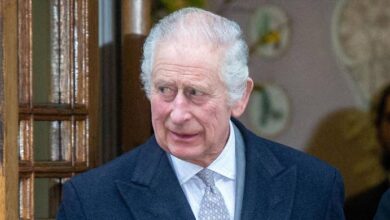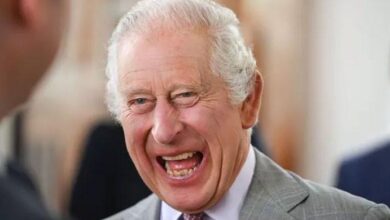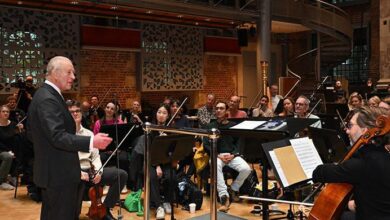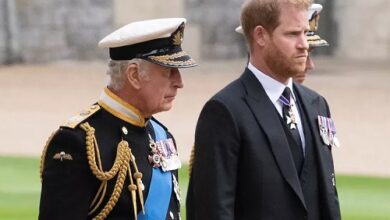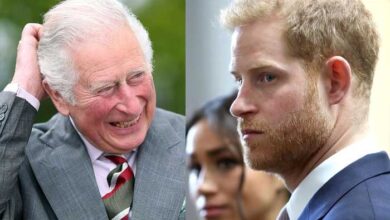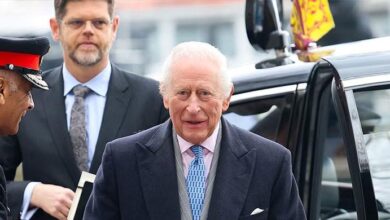King Charles Takes Brutal Action to Resolve Ongoing Feud with Prince Andrew

King Charles III, known for his devotion to duty and his meticulous approach to royal responsibilities, has reportedly taken drastic measures to resolve the ongoing feud with his brother, Prince Andrew, over Royal Lodge.
The monarch’s decision to cut off Andrew’s allowance and firmly demand his relocation has been described as both “brutal” and “cruel” by insiders, but is being seen as necessary to uphold the integrity of the crown.
At 76, and undergoing cancer treatment following a diagnosis earlier this year, King Charles is reportedly focused on resolving lingering disputes within the House of Windsor before his reign ends.
His handling of the situation with Prince Andrew underscores this determination.
The dispute over Royal Lodge, a sprawling Grade II-listed property in Windsor that has been Andrew’s primary residence since 2003, has been a point of contention within the royal family.
Andrew’s reluctance to vacate the property despite mounting financial pressures and King Charles’ desire to streamline royal expenses has created a standoff.
A palace insider revealed, “Charles has tried absolutely everything to get Andrew to cut back on his expenses and stop living such a publicly extravagant lifestyle.”
Despite the king’s repeated efforts, Andrew reportedly remains defiant, insisting that he is entitled to maintain his current standard of living as a member of the royal family.
After years of unsuccessful attempts to resolve the issue amicably, King Charles has taken what sources describe as the “nuclear option.”
This involves cutting off Andrew’s annual allowance, effectively forcing him to find alternative means to fund his lifestyle and maintain Royal Lodge.
“Unfortunately, this has left Charles in an untenable position and with few good remedies,” one source explained. “From his perspective, he had no other choice.”
The move reflects Charles’ growing frustration with Andrew’s refusal to compromise.
Another insider elaborated, “Charles believes that duty to the crown comes before any allegiance to his blood kin from the House of Windsor. He is determined to deal with this matter decisively before it tarnishes his legacy further.”
Despite losing his £249,000 annual allowance, Andrew reportedly has sufficient personal funds to maintain his residence at Royal Lodge for now.
However, his refusal to step down gracefully has intensified the conflict.
“Andrew has been obstinate and believes he is within his royal rights to not surrender a single dime,” a source stated.
“He has relied on the support of wealthy friends and allies to sustain his lifestyle, but this reliance could backfire if he is seen as unwilling to adapt.”
Adding to the tension is Andrew’s diminished public role following the fallout from his controversial association with Jeffrey Epstein.
Stripped of his royal patronages and military titles in 2022, Andrew’s position within the family has become increasingly isolated.
For King Charles, this issue goes beyond personal grievances—it’s about the long-term reputation of the monarchy.
His actions are part of a broader effort to modernize the royal family and ensure its survival in a rapidly changing world.
“Charles knows his days upon the throne are numbered, and he is bent on solving the Andrew problem before it’s too late,” a royal source explained.
“He sees Andrew’s extravagant lifestyle and refusal to step back as a liability to the crown.”
The king’s determination is further motivated by his sense of responsibility to future generations of royals, including Prince William and Prince George.
Read More: Meghan Markle Planning to Leave the US Under the Influence of a Mega Star
By addressing these issues now, Charles hopes to leave a more stable and respected monarchy for his successors.
The public’s response to King Charles’ decision has been mixed. Some view his actions as harsh but necessary to protect the monarchy’s reputation, while others see them as overly punitive.
The decision to cut off Andrew’s allowance, in particular, has sparked debates about whether the Duke of York is being unfairly targeted.
Critics argue that Charles could have handled the matter more tactfully, given Andrew’s current status and the sensitive nature of their family ties.
Supporters, however, point out that Andrew’s continued presence at Royal Lodge and his refusal to adapt have left the king with little choice.
As the situation unfolds, the fate of Royal Lodge remains uncertain. While Andrew has so far resisted calls to vacate the property, it is unclear how long he will be able to sustain his position without financial support from the crown.
The controversy also raises broader questions about the use of royal residences and the distribution of resources within the family.
King Charles’ decision to tackle these issues head-on reflects his commitment to modernizing the monarchy, even at the cost of familial harmony.
King Charles’ actions against Prince Andrew mark a pivotal moment in his reign.
By addressing the Royal Lodge feud decisively, the king is sending a clear message about his priorities: the stability and reputation of the crown take precedence over personal loyalties.
While this approach may strain his relationship with Andrew, it underscores Charles’ determination to uphold the values of duty and accountability that define the modern monarchy.
As the king navigates these challenges, his efforts to protect the institution’s future will likely shape his legacy for years to come.
